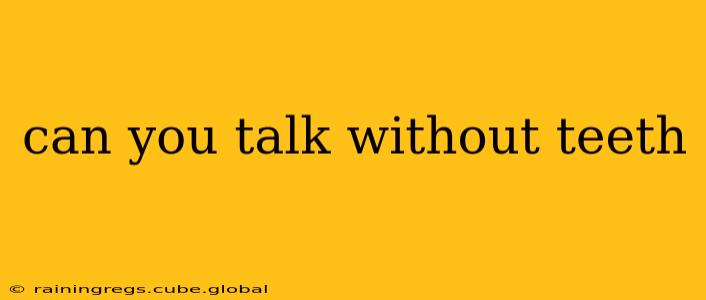Can You Talk Without Teeth?
The ability to talk without teeth is a fascinating question that delves into the complexities of human speech. While significantly more challenging, it's absolutely possible, though the quality and clarity of speech will be noticeably altered. Let's explore this further.
How Do Teeth Contribute to Speech?
Before addressing the core question, understanding the role of teeth in speech production is crucial. Teeth play a vital role in articulating certain sounds, particularly those requiring precise placement and control of the airflow from the lungs. Sounds like "f," "v," "th" (as in "thin" and "this"), "s," "z," "sh," and "ch" rely heavily on the precise positioning of the tongue against the teeth. They act as a crucial point of contact, shaping the airflow to create these distinct sounds. The absence of teeth affects the formation of these sounds significantly.
Can You Talk Without Teeth? The Answer is Yes, but…
Yes, you absolutely can talk without teeth. Many individuals who have lost their teeth, either through accident, disease, or aging, still communicate effectively. However, their speech will likely sound different. The absence of teeth impacts the precision and clarity of articulation, leading to several noticeable changes:
- Altered pronunciation: Sounds requiring precise tongue-to-tooth contact will be significantly affected. These sounds may be muffled, slurred, or replaced with similar-sounding alternatives.
- Changes in vocal quality: The overall resonance of the voice might change, affecting the clarity and projection of speech.
- Increased effort: Speaking without teeth often requires more conscious effort and concentration to compensate for the lack of precise articulators.
- Development of compensatory strategies: Individuals adapt over time, developing strategies to compensate for the missing teeth and maintain intelligible communication. This might involve adjusting tongue placement or using alternative parts of the mouth.
What Happens to Speech After Tooth Loss?
The impact of tooth loss on speech depends on several factors, including:
- The number of missing teeth: Loss of a single tooth might have minimal impact, while extensive tooth loss can significantly affect speech clarity.
- The location of missing teeth: Missing front teeth will have a more profound impact than missing molars.
- The individual's adaptation: Some people adapt more quickly and easily than others.
How Do People Compensate for Missing Teeth?
Several options exist to help improve speech after tooth loss:
- Dentures: These are removable artificial teeth that restore the shape and function of the natural teeth, significantly improving speech clarity.
- Dental implants: These surgically implanted artificial tooth roots provide a stable foundation for artificial teeth, offering a more permanent and natural-feeling solution.
- Speech therapy: A speech therapist can help individuals develop compensatory strategies and techniques to improve articulation and overall speech quality.
Can Babies Talk Without Teeth?
Babies, of course, are born without teeth. Their ability to produce sounds is limited in the early stages, but gradually they develop the ability to create various sounds and eventually words, despite the absence of teeth. This is because speech development in infants relies heavily on other articulators like the tongue, lips, and jaw.
In conclusion, while teeth play a significant role in the precise articulation of certain sounds, it is indeed possible to talk without them. The quality of speech will be affected, but with adaptation and potentially the use of dentures or implants, clear communication remains achievable.
